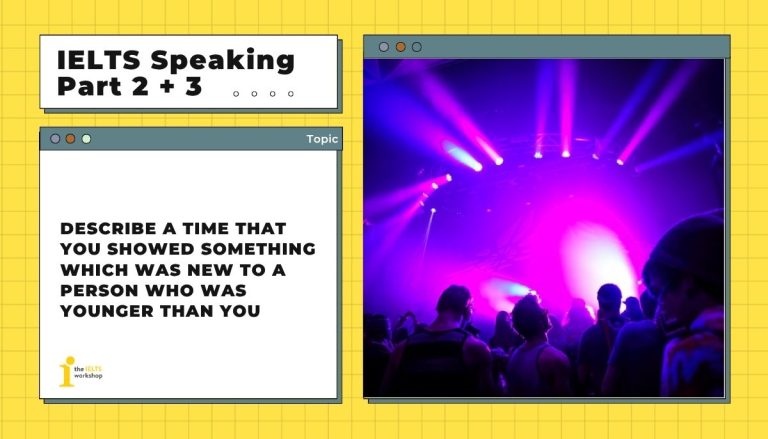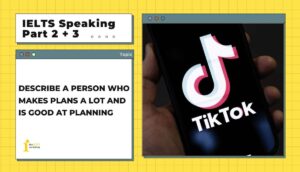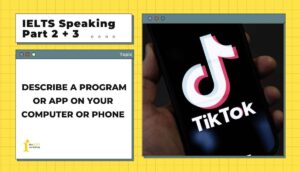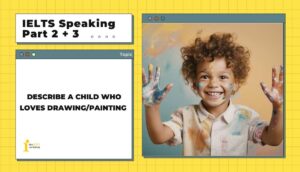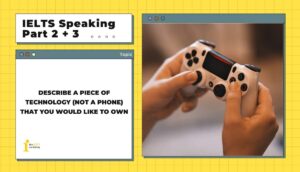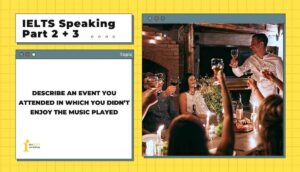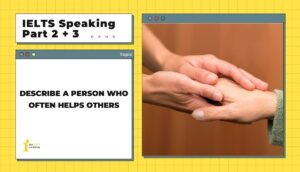Trong bài viết luyện Speaking tuần này, chúng ta sẽ cùng tham khảo một bài mẫu đến từ thầy Đỗ Quang Thành – giáo viên tại The IELTS Workshop, với chủ đề Describe a time that you showed something which was new to a person who was younger than you.
Part 2: Describe a time that you showed something which was new to a person who was younger than you
You should say:
- When it was
- What it was
- Who you showed it to
- How you showed it
- Why you showed it
- And explain how you felt about it
1. Bài mẫu (Sample)
This happened about two years ago, around May, specifically during the May Day break. It was just when summer was really landing here in North Vietnam, with those lovely warm rays of sunlight and a gentle, breezy wind in the air – perfect festival weather.
What I showed him was a music festival called Equation Music Festival. It’s an electronic dance music gathering that features over twenty artists – Vietnamese, regional, and international. What makes it really special is its unique setting: it spans across two stages, one literally in a paddy field and the other, my favorite, in a natural cave in Mai Chau. For those of us who are seasoned goers, we affectionately call it “The Cave Rave.” Mai Chau itself is a stunning mountain tourist destination in Hoa Binh province, which just adds to the whole magical vibe.
The person I showed it to was my younger brother. He’s just one year younger than me, and while he’s a huge fan of music, especially dance music, he’d actually never gone to an outdoor electronic dance music festival before. He was used to the club scene in Hanoi, but this was a completely different ballgame.
After we arrived and settled in, I really made an effort to show him the full culture of raving, which is really the centerpiece of every electronic dance music festival. We explored everything from the vibrant costumes people wear, to the typical food and drinks served at the venue. I showed him the unique dance styles, how people socialize and connect with other music lovers, and explained the different music genres we were hearing. I even shared some of the stories behind the DJs’ sets, which really helps you appreciate their artistry.
I showed him this because I really wanted to give my brother a full-blown dance music experience, to truly take it up a notch for him. Before, he was used to dancing and vibing in a club, but this trip took him to a whole new level of ecstasy, euphoria, liberation, and a profound closeness to nature. It’s a feeling that’s hard to describe unless you’ve experienced it.
And honestly, how I felt about it was just incredible – it truly felt like a dream come true for me. Being able to dance, sing, laugh, eat, and drink with one of the most beloved people in my world was just amazing. I was so incredibly glad to introduce my brother to this new scene of freedom of self-expression, liberation, and pure pleasure. Seeing him have so much fun, and hearing him express his excitement to return to this “Cave Rave,” really reminded me that I had done a wonderful job. I’d shown him a new lifestyle, introduced him to a new crowd, and opened up a new frontier of music. It was a truly fulfilling experience.
Sample by Do Quang Thanh, IELTS Teacher at The IELTS Workshop
2. Từ vựng (Vocabulary)
- summer landing – mùa hè bắt đầu/đến
- warm rays of sunlight – những tia nắng ấm áp
- gentle, breezy wind – làn gió nhẹ, lộng gió
- perfect festival weather – thời tiết lý tưởng cho lễ hội
- electronic dance music gathering – buổi tụ tập/sự kiện nhạc điện tử
- features over twenty artists – có sự góp mặt của hơn hai mươi nghệ sĩ
- unique setting – khung cảnh độc đáo
- spans across two stages – trải dài/trải rộng trên hai sân khấu
- seasoned goers – những người có kinh nghiệm tham dự
- affectionately call – trìu mến gọi
- stunning mountain tourist destination – điểm đến du lịch núi tuyệt đẹp
- completely different ballgame – tình huống hoàn toàn khác biệt (thành ngữ)
- centerpiece of – điểm nhấn, trung tâm của
- vibrant costumes – trang phục rực rỡ
- take it up a notch – nâng tầm, đưa lên một cấp độ mới (thành ngữ)
- profound closeness to nature – sự gần gũi sâu sắc với thiên nhiên
- freedom of self-expression – tự do thể hiện bản thân
- new frontier of music – một chân trời mới của âm nhạc
Xem thêm: Giải đề IELTS Writing Task 2: Art and Music in secondary school
Part 3:
1. Is it possible for a person to achieve something without motivation?
Honestly, in my opinion, no, it’s virtually impossible for a person to truly achieve something meaningful without some form of motivation. I firmly believe that without that underlying drive – be it a clear goal, an enticing incentive, a tangible reward, or even a compelling consequence like a punishment or the fear of failure – one would find it incredibly difficult to even get started.
Think about it: if there’s no motivational ‘pull’ or ‘push,’ it becomes incredibly easy to procrastinate, to put off, or to simply delay what we might theoretically want to achieve. Without that foresight of an outcome, without a reason to push through challenges, our efforts would likely dwindle. For example, if you’re trying to learn a new language, but you have no motivation – no upcoming trip, no career goal, no personal interest – it’s highly unlikely you’d stick with it past the first few lessons. The initial burst of curiosity might fade, and without a deeper reason, there’s nothing to compel you to continue when it gets difficult. So, for sustained effort and genuine accomplishment, motivation is absolutely fundamental.
Từ vựng:
- enticing incentive: động cơ hấp dẫn/mời gọi
- compelling consequence: hậu quả/kết quả thuyết phục
- dwindle: giảm dần, teo tóp lại
2. How can young people be motivated to learn new things?
That’s a really interesting question, and I think there are several key ways to motivate young people to learn new things.
Firstly, and perhaps most powerfully, is through self-discovery. When young people stumble upon something that genuinely fascinates them – whether it’s programming, a new sport, or an obscure historical topic – the motivation to learn comes from within. It’s not about external pressure; it’s about curiosity and the joy of understanding. This often sparks this kind of internal drive that no teacher or parent can artificially implant.
Secondly, the role of parents and teachers is absolutely crucial in breaking down complex subjects into manageable pieces. When adults guide young learners and celebrate small victories along the way, it builds confidence and shows them that success is attainable.
And finally, we can’t ignore the impact of peer pressure, both positive and negative. While often seen in a negative light, healthy competitive spirit can be a huge motivator. If a young person sees their friends excelling in a particular skill or enjoying a new hobby, they might be inspired to try it themselves.
Từ vựng:
- stumble upon something: tình cờ khám phá ra điều gì đó
- spark this kind of internal drive: khơi dậy loại động lực nội tâm này
- break down complex subjects: chia nhỏ các chủ đề phức tạp
- healthy competitive spirit: tinh thần cạnh tranh lành mạnh
3. What skills do you think children should learn before going to school?
First, and very importantly, I believe children should learn sharing skills before they even step foot in a classroom. Up until that point, their world has often revolved around their immediate family, where possessions might be clearly defined as ‘theirs.’ But school is the first real encounter with a larger community where resources are shared. Learning to share toys, art supplies, playground space, and even attention from the teacher, is crucial for fostering cooperation and empathy. It teaches them to be part of something bigger than themselves and lays the groundwork for understanding give-and-take in social interactions.
Secondly, and equally vital, are basic manners. Teaching children politeness, respect, and fundamental social etiquette – like saying ‘please’ and ‘thank you,’ waiting their turn, listening when others are speaking, and respecting personal space – is incredibly important. These aren’t just arbitrary rules; they are the lubricants of social interaction. It helps them build positive relationships with their peers and teachers, setting them up for long-term social success.
Từ vựng:
- foster cooperation and empathy: thúc đẩy sự hợp tác và đồng cảm
- lay the groundwork for: đặt nền tảng cho
- basic manners: phép tắc cơ bản
- lubricants of social interaction: chất bôi trơn cho các tương tác xã hội
4. Why are some people not willing to ask help from others while studying?
I think the fundamental reason at play here is indeed the premise of self-reliance, which many people, myself included, often believe they can thrive on.
There are several facets to this. For some, this self-reliance might have been ingrained from a young age; perhaps they were forced to rely on themselves due to circumstances, leading them to develop a strong independent streak. They simply aren’t accustomed to reaching out.
Then there’s the issue of trust. Some individuals may have had negative past experiences – perhaps a conflict, a betrayal, a lie, or even a scam – that caused them to lose trust in other people.
And finally, some people just feel a deep sense of control when they work alone and resolve their problems independently. There’s a certain satisfaction in figuring things out by yourself, and for these individuals, asking for help might feel like admitting vulnerability or relinquishing that control.
All of these factors can collectively foster a complex psychological barrier, making it hard for them to seek help even when it might benefit them greatly.
Từ vựng:
- fundamental reason at play: lý do cơ bản đang tồn tại
- strong independent streak: tính cách độc lập mạnh mẽ
- admit vulnerability: thừa nhận sự dễ bị tổn thương
- relinquishing that control: từ bỏ sự kiểm soát đó
- complex psychological barrier: rào cản tâm lý phức tạp
5. What are the differences between the things adults learn and the things that children learn?
One of the most striking distinctions is that most children are primarily driven by curiosity and an innate desire to explore. They might be fascinated by how a toy works or why the sky is blue. Their learning is often spontaneous and driven by wonder, without any clear aim in mind. It’s learning for the sake of learning – for the joy of discovery.
Adults, by contrast, usually learn with purpose. Their learning is more structured and intentional. There is often a clear foreseen outcome behind their efforts. They might study a new language to get a promotion, take cooking classes to improve their family’s nutrition, or read business books to grow their startup. The focus is typically on how this knowledge will serve a personal, professional, or practical purpose.
Từ vựng:
- foreseen outcome: kết quả được dự đoán trước
- primarily driven by curiosity: chủ yếu được thúc đẩy bởi sự tò mò
- innate desire: mong muốn bẩm sinh
- spontaneous and driven by wonder: tự phát và được thúc đẩy bởi sự ngạc nhiên
Sample by Do Quang Thanh, IELTS Teacher at The IELTS Workshop
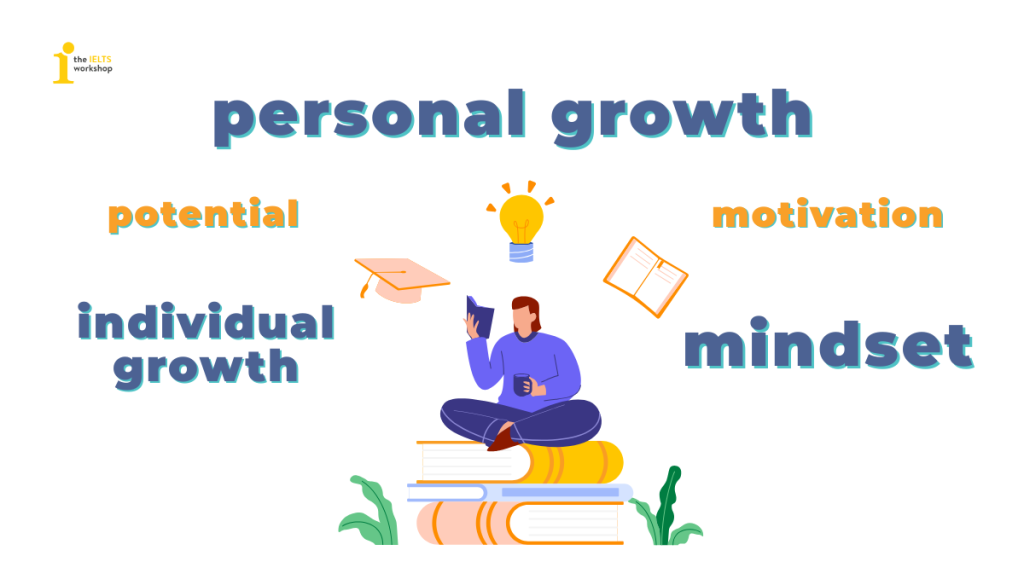
Từ vựng mở rộng
- Individual growth /indi’vidʒʊəl grəʊθ/: Phát triển cá nhân
- Personal fulfillment: Hoàn thiện cá nhân
- Potential /pəˈtɛnʃəl/: Tiềm năng
- Motivation /ˌmoʊtɪˈveɪʃən/: Động lực
- Mindset /ˈmaɪndset/: Tư duy
- Resilience /rɪˈzɪliəns/: Sự kiên cường
- Perseverance /p3ːsi’viərəns/: Sự kiên trì
- Consistency /kən’sistənsi/: Sự kiên định
- Empowerment /ɪmˈpaʊərmənt/: Trao quyền
- Well-being /ˈwel ˈbiːɪŋ/: Sức khỏe và hạnh phúc
Xem thêm: Khám phá 70+ từ vựng chủ đề phát triển con người phổ biến
Tạm kết
Hi vọng bài mẫu trên đã mang đến cho bạn một góc nhìn rõ ràng hơn về cách xử lý chủ đề Describe a time that you showed something new to someone younger than you trong IELTS Speaking Part 2 + 3
Để luyện nói hiệu quả hơn, bạn có thể kết hợp thực hành đa dạng chủ đề và tham khảo thêm các nguồn học chất lượng như KHO BÀI MẪU IELTS SPEAKING và Bộ đề dự đoán IELTS Speaking Quý 2 (T6 – 08/2025) – Full 3 Parts.
? Đừng bỏ lỡ cơ hội HỌC IELTS MIỄN PHÍ cùng các giáo viên tại The IELTS Workshop – đăng ký ngay hôm nay nhé!


